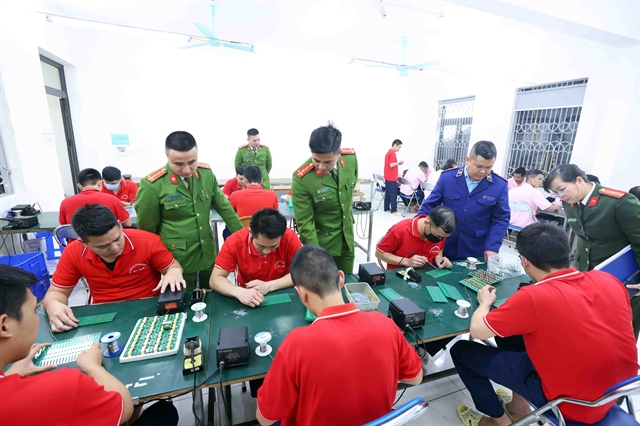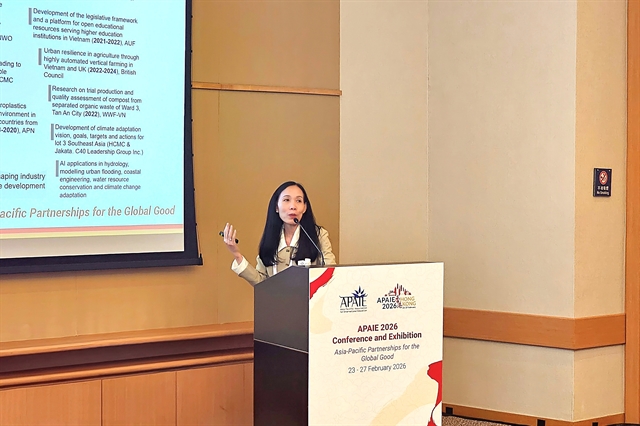 Society
Society


|
| The police give guidance to trainees at the Drug Rehabilitation Centre No 4 in Hà Nội to produce electronic components. — VNA/VNS Photo Phạm Kiên |
HÀ NỘI — Việt Nam is accelerating its fight against drugs nationwide, setting ambitious goals of 20 per cent of communes becoming drug-free by 2025 and at least 50 per cent by 2030, alongside 15-20 per cent of provinces and cities.
These targets were outlined in a Government notice, summarising Prime Minister Phạm Minh Chính’s conclusions at a national conference on implementing the National Target Programme for drug prevention and control through 2030.
The Prime Minister noted that drug prevention and control in Việt Nam faces significant challenges due to global drug trends and the continuing complexity of domestic drug crimes and addiction. In the first nine months of this year, authorities arrested more than 37,500 drug offenders in over 19,000 cases, seizing nearly 3.4 tonnes of synthetic drugs, more than 2 million synthetic drug pills, 243kg of heroin and 971kg of marijuana — amounts equivalent to the annual average during 2020–2024.
Authorities predict that drug crime and addiction will continue to evolve in complexity due to global and regional influences, making drug prevention an urgent priority to protect public safety, family wellbeing, national security and sustainable socio-economic development.
Strengthening inspections
PM Chính has ordered leaders at all levels to take a direct role in overseeing the programme, strengthen inspection and supervision, and strictly handle violations. He stressed the need to improve drug control legislation, including amending the Drug Prevention Law and related guidance, to provide a comprehensive legal framework for enforcement.
Central and local authorities are required to urgently develop and approve detailed plans with clear objectives, roadmaps and assigned responsibilities following a ‘six-clear’ principle: clear people, tasks, responsibilities, authority, deadlines and results. Authorities must adhere to objectives and solutions to ensure timely and effective programme implementation.
High-intensity campaigns
The Prime Minister tasked the Ministry of Public Security (MPS), Ministry of National Defence, Ministry of Finance and specialised forces to carry out decisive crackdowns on drug crime, disrupt supply and demand networks and focus on key routes and areas. High-intensity campaigns are to prosecute and strictly handle perpetrators, particularly ring leaders, while promoting international cooperation.
Communication campaigns will build a mass movement under the slogan 'All people participate in drug prevention,' emphasising that every citizen is a soldier, every family a stronghold, and every locality a fortress against drugs. Units will encourage public condemnation of drug crime and addiction, engage organisations in detecting and managing addicts, and build ‘drug-free’ models in workplaces, schools and enterprises.
Rehabilitation efforts will be strengthened by promoting the role of religious and social-political organisations in managing addicts. The MPS is also tasked with coordinating with ministries and local authorities to issue guiding documents and monitoring indicators, ensuring consistent and effective implementation of the programme by October 2025.
The MPS will work with the Ministry of Health and local authorities to assess rehabilitation facilities, upgrade equipment, and apply technology in addict management. The Ministry of Education and Training will guide localities to create ‘drug-free schools’ nationwide starting from the 2025-2026 school year.
Provincial and municipal people’s committees will assign clear responsibilities to departments, strengthen supervision and ensure the completion of assigned tasks with specific targets, timelines and solutions. Localities are instructed to prioritise local budget investment, integrate the programme with other socio-economic development initiatives, and avoid dispersion and waste.
Policies will also be issued to encourage agencies, enterprises and organisations to provide vocational training, jobs, preferential loans and social support for rehabilitated individuals to support their reintegration into the community. — VNS




